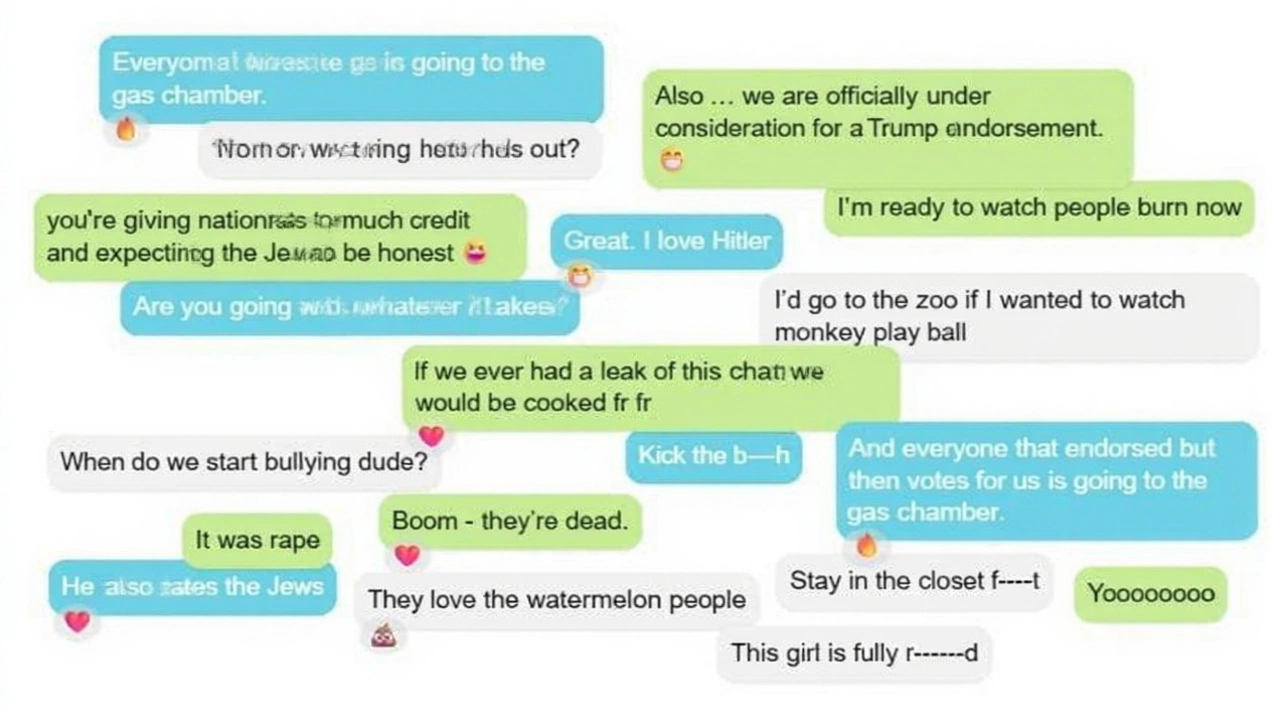Leaked Chats Reveal Young Republican Leaders Praising Hitler, Prompting Mass Resignations

- Aldo Santoso
- 16 Oktober 2025
- 0 Komentar
When Peter Giunta, chair of the New York State Young Republicans and chief of staff for Mike Reilly, sent a Telegram message that read “I love Hitler,” the political world stopped scrolling. The messages, part of a 2,900‑page leak published by Politico on October 14, 2025, sparked a firestorm because they weren’t isolated jokes—they were embedded in over 28,000 messages exchanged by senior officers of the Young Republicans movement across New York, Kansas, Arizona and Vermont between March and September 2025. The fallout is already reshaping the youth wing of the GOP, forcing dismissals, chapter disbandments and a nationwide call for reform.
How the Leak Came to Light
According to the Politico report, a former member of the Telegram group handed the logs to a journalist after growing uncomfortable with the tone. The cache contains 2,900 pages of screenshots, each timestamped, showing a steady stream of slurs, Holocaust references, and outright threats. The chat room was originally created by Giunta as a campaign‑style rally for his bid to lead the New York chapter, but it quickly morphed into a private forum where leaders from the Kansas, Arizona and Vermont Young Republican chapters exchanged memes and political gossip.
What makes this leak especially damning is the sheer volume of extremist language. From “everyone that votes no is going to the gas chamber” to jokes about “fixing the showers” because “gas chambers don’t fit the Hitler aesthetic,” the utterances cross a line that even the most permissive political discourse rarely approaches. Joe Maligno, the general counsel for the New York State Young Republicans, was caught typing, “Can we fix the showers? Gas chambers don’t fit the Hitler aesthetic.”
Immediate Reactions from Leaders and Parties
The Young Republican National Federation, the national umbrella for the youth organization, issued a statement on October 15 via X, declaring itself "appalled by the vile and inexcusable language revealed" and demanding that any involved individual resign from all positions. The statement read, “Such behavior is disgraceful, unbecoming of any Republican, and stands in direct opposition to the values our movement represents.”
Mike Reilly, the Staten Island assemblyman who employed Giunta, acted swiftly, firing him the same day the leak hit the headlines. "I will not tolerate hateful rhetoric from anyone representing my office," Reilly tweeted.
In Kansas, the state Republican Party took a harder line, voting to disband the Kansas Young Republicans chapter altogether. The decision came after two members were identified as having used anti‑Black slurs and homophobic epithets, according to a report by Axios.
National figures also weighed in. Elise Stefanik, House Republican Conference Chair, said she was "absolutely appalled" and called the messages "heinous, antisemitic, racist and unacceptable." Her senior adviser, Alex deGrasse, emphasized that none of the individuals had ever been employed by her office and urged immediate resignations.
Even Vice President JD Vance entered the fray, posting, “I refuse to join the pearl clutching,” a comment that many observers called dismissive of the seriousness of the revelations.
Why This Scandal Matters Beyond the Youth Wing
The fallout isn’t just a PR nightmare for a handful of state chapters; it raises deeper questions about the GOP’s recruitment and vetting processes. The Young Republican National Federation boasted roughly 50,000 members in its 2024 annual report and claimed over 200 local chapters nationwide. Yet the organization’s past has been peppered with similar controversies—a 2023 incident in Florida where a chapter leader made antisemitic remarks resulted only in a formal warning.
Political analysts argue that the current leak could trigger a wave of legislative scrutiny. "If youth groups tied to a major party are openly sharing extremist content, legislators will feel compelled to examine whether there’s a breach of hate‑speech laws," said Dr. Lena Ortiz, a professor of political science at New York University. She added that the leak might also influence upcoming mid‑term strategies, as parties scramble to distance themselves from toxic elements.
From a strategic standpoint, the scandal could hinder fundraising. Donors, especially corporate ones, are wary of association with groups that could damage brand reputation. Already, several major GOP donors have publicly expressed concern, with one senior donor saying, “I can’t justify giving money to an organization where leaders are praising Hitler.”

Calls for Reform and What Comes Next
In the wake of the revelations, the Young Republican National Federation announced a task force to overhaul its leadership screening. The plan includes mandatory background checks, a zero‑tolerance policy for hate speech, and an external ethics auditor. The federation hopes to roll out the new guidelines by early 2026.
State parties are also conducting internal investigations. The New York State Republican Committee has opened a formal inquiry, while the Arizona and Vermont Republican parties have pledged to review their youth affiliates’ communications policies.
For Giunta, the damage may be irreversible. In a statement to Politico on October 14, he claimed he was “sorry to those offended” and suggested the logs could have been “deceptively doctored.” However, the timestamped screenshots make that defense hard to sustain.
Ultimately, the scandal underscores a growing tension within the Republican Party: the push between traditional conservatism and a more radical, incendiary fringe. How the party navigates this divide could shape its electoral fortunes for years to come.
Background: The Rise of the Young Republican Movement
The Young Republican National Federation was founded in 1931, originally envisioned as a training ground for future party leaders. Over the decades, it has produced several notable alumni, including former Senate Majority Leader Mitch McConnell and former Secretary of State Mike Pompeo. Membership surged after the 2016 presidential election, hitting roughly 75,000 registered members by 2020.
That growth, however, came with challenges. Critics have long warned that the organization’s decentralized structure makes it difficult to enforce consistent standards across its chapters. The 2023 Florida incident, where a local leader posted an antisemitic meme, sparked the first wave of calls for a national code of conduct—calls that were largely ignored until now.
Today, the federation operates out of Alexandria, Virginia, and runs annual leadership conventions, scholarships, and policy workshops. Its influence on the broader GOP is significant: many state GOP chairs and congressional staffers were once Young Republicans, and the organization often serves as a pipeline for campaign volunteers.
Frequently Asked Questions
What specific language in the chat led to the resignations?
Messages included overt praise for Adolf Hitler (“I love Hitler”), threats that voters would be sent to gas chambers, and jokes about “fixing the showers” because “gas chambers don’t fit the Hitler aesthetic.” Such language was deemed hateful and extremist, prompting immediate calls for resignations.
Which state chapters were directly affected?
The New York State Young Republicans saw the firing of their chair, Peter Giunta. Kansas disbanded its entire Young Republicans chapter. Arizona and Vermont chapters are under investigation, though no formal actions have been announced yet.
How is the national Young Republican organization responding?
The Young Republican National Federation issued a statement condemning the language, demanded immediate resignations, and announced a task force to overhaul leadership vetting, including background checks and an external ethics auditor, slated for early 2026.
Will this scandal impact upcoming elections?
Political analysts say the fallout could hurt GOP fundraising and force candidates to distance themselves from extremist elements, potentially influencing voter perception in the 2026 midterms.
What reforms are being proposed to prevent future incidents?
Proposed reforms include mandatory background checks for all youth leaders, a zero‑tolerance policy for hate speech, regular audits by an independent ethics board, and mandatory training on inclusive communication.


